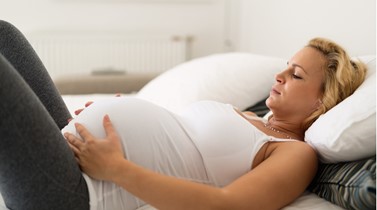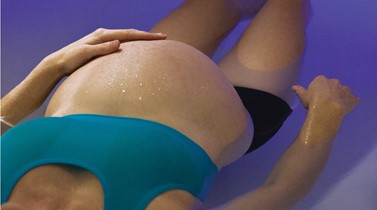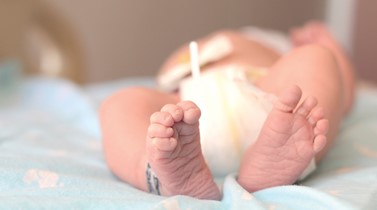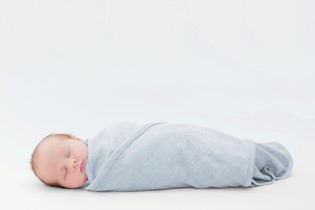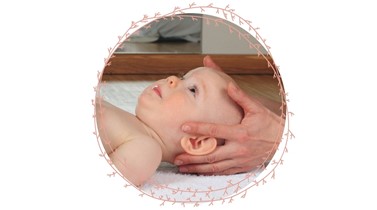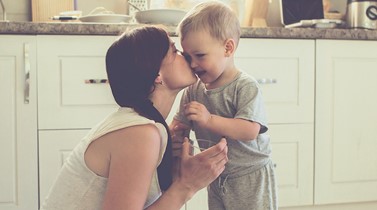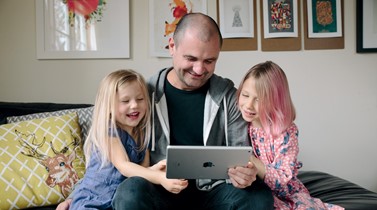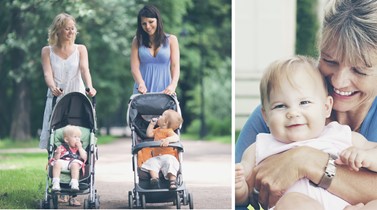When your baby sleeps but you can't: tips for getting to sleep

Some parents are wide awake at night, even when their children are peacefully sleeping. Physiotherapist Renee Vincent explains why cleaning up our sleep hygiene is a helpful and healthy idea.
As any parent knows, sleep is a cherished and sought-after commodity. Post-birth, you very quickly find yourself on a quest to understand your child’s sleep needs and how to guide them into healthy sleep habits – so they thrive and you stay sane. Infant and child sleep is the subject of many articles and, when my son was competing for the title of world’s worst sleeping baby, I remember devouring any information I could get my hands on. What was less talked about, I discovered, was how parents recover from these months or years of sleep deprivation and how they can restore their own good sleep habits.
The word 'habit' is important with regards to sleep. Just as we teach our little ones how to get to sleep and stay asleep, as adults we are equally responsive to training in the form of either good or bad habits.
As parents, we quickly adapt to functioning on less sleep than we ever thought possible. Then finally, either by hard work, the passing of time or a miracle, your child sleeps through the night. But this doesn’t mean you automatically get a good night’s rest. It’s common for parents to continue feeling exhausted and not be able to sleep well, despite the fact that their child is now sleeping for at least eight hours, at least some nights a week.
I often talk about sleep with the parents I treat in our clinic. In relation to injury, it is helpful to assess important lifestyle factors that promote the body’s ability to heal. We often talk about the three pillars of health: exercise, nutrition and sleep. Exercise and nutrition typically receive a lot more attention than sleep. Most people understand why they need to be eating well and exercising daily, but evidence now shows that without good sleep, we can’t benefit from all that good food and exercise.
The tyranny of tiredness
If my patients are anything to go by, sleep is an area where parents are struggling – and not just because of their children. In fact, the reasons they have for not sleeping well mainly relate to habits that have formed over time. Habits such as staying up late watching television to unwind once the kids are finally asleep; getting caught up on the computer or the internet; doing housework once the kids are in bed; talking on the phone or Skype to relatives overseas; or not being able to go out until the kids are asleep thus getting home late. These are all understandable – getting things done in peace and quiet or having some social time with adults is important. Unfortunately, research shows that it is not possible to get away with reduced or poor quality sleep without putting your health at risk.
Medical studies have revealed a variety of potentially harmful effects of sleep deprivation, such as increased blood pressure, impaired control of blood glucose, upset balance of certain hormones in the body and increased inflammation. Long term, these are associated with health conditions such as diabetes, heart disease and obesity. For example, poor sleep leads to increased production of cortisol, the stress hormone, and is also associated with increases in the secretion of insulin following a meal. Higher levels of insulin are associated with weight gain.
Why we sleep, and why we suffer when we aren’t sleeping, are the subjects of much research. Intuitively we know we feel better after a good night’s sleep. We are starting to understand how our health can suffer long-term if we sleep poorly. Various theories try to define the exact function sleep serves. Some suggest that, by reducing us to inactivity, sleep allows us to conserve energy and resources and stay out of harm’s way. However, it is the recent research regarding the restorative function of sleep that provides the most motivation to pursue good sleep habits. Major restorative functions in the body, like muscle growth, tissue repair, protein synthesis, and growth hormone release occur mostly, or in some cases only, during sleep. We need sleep to replenish and rebuild our internal systems and physical body, and to heal from pain or injury.
Another function of sleep only recently understood is that sleep is related to brain plasticity, or the ability of the brain to change its structure and organisation. Therefore, just like with children, sleep has an important effect on the adult brain and on adults’ ability to learn and perform a variety of tasks.
Get good sleep
Practices necessary for normal, quality night-time sleep and full daytime alertness are referred to as ‘sleep hygiene’. Thinking about these habits as sleep hygiene helps us to prioritise them. Just as we brush our teeth for good dental hygiene, we should get to bed on time for good sleep hygiene.
While this article addresses sleep problems that have developed through altered sleep hygiene practices (and are likely to respond to re-establishing good sleep hygiene), it is important to clarify that some people will be suffering from actual sleep disorders, such as sleep apnoea, severe insomnia, restless leg syndrome and circadian rhythm disorders. If you feel you might be suffering from a more serious sleep problem, it is best to talk to your GP.
It can be challenging to implement changes such as those I have recommended. You may well need consultation with your partner and a concerted effort to see results. I would recommend you and your partner devise your own evening schedule and sleep plan and commit to trialling it for two weeks. Then reassess, take note of obstacles, make some modifications, and try again. Like any new habit, it will take practise and perseverance to get into good habits again, but the benefits will be worth it – just visualise yourself as the well-rested, loving and patient parent you want to be and persist with improving your sleep hygiene.
THE RULES OF SLEEP HYGIENE
Adopt a consistent sleep schedule
The ability to stay alert for most of the day, then fall asleep and stay asleep when we want to, is due to two systems in the body that balance each other: the homeostatic sleep drive and the circadian alerting system. The consistency of our sleep and wake schedule sets the pattern for how these systems balance each other, just like in babies and young children. When synchronised, they interact to provide consolidated periods of alertness and sleep. Things such as shift work and jet lag de-synchronise these systems and result in you being awake when you want to sleep, and vice versa. To keep your internal clock and sleep schedule synchronised, you need to have a consistent bed and wake time. While this might not always be possible in a young family, make the effort to do it when you can and your body will handle the patches of disrupted sleep better.
● Napping can also interfere with your circadian rhythm, but for parents going through a bad patch of disrupted sleep, naps are a real necessity. Aim for short naps and make sure they finish before 5pm.
● Another tip for setting your internal clock is to be exposed to light early in the day, so try and get outside in the morning if possible.
● Establish a helpful pre-sleep routine. Sound familiar? Again, just as for children, adult bodies can be trained and prepared for sleep by implementing soothing sleep cues before bed. Try taking a bath or shower (the rise and then fall of body temperature encourages sleepiness), reading a book, or doing some relaxation breathing or exercises each night before bed. Conversely, having stressful conversations or trying to complete stressful tasks just before bed will cause you to release stress hormones that interfere with sleep.
● Dimming the light while you are relaxing and preparing for bed will also help release another important hormone in the sleep process – melatonin. Melatonin is released by your brain in the evening and for 12 hours overnight. Studies have shown that exposure to electrical light in the late evening disrupts melatonin signalling. Blue light, the type emitted by electronic devices, is proving to be especially troublesome, hence the importance of powering down our devices in the evening – at least one to two hours before we go to sleep.
Optimise your sleep environment
● Another factor that encourages melatonin release is darkness, so ensuring your room is adequately dark (consider blackout blinds) is important. The temperature should be a comfortable 18–23˚C and external noise can be dampened using earplugs or even a white noise machine.
● As with children, the adult brain needs to associate the bedroom with sleep, so ‘awake’ activities, like working on a laptop or watching television, are not recommended in bed.
● Another tip to avoid the development of negative associations is to not lie in bed awake for hours if you can’t sleep. After 20 minutes it is good to get up and read or relax in another room with low lighting until you feel sleepy again, and then try to go back to bed. Don’t get into the habit of watching the clock as this will just make things worse. 
Beware of stimulants
● Caffeine is a tempting antidote to the tiredness that comes with parenting – coffee, tea, cola and chocolate all contain caffeine and can interfere with sleep when consumed within four to six hours of bedtime.
● That evening glass of wine can also catch you out. While alcohol often initially creates a feeling of sleepiness and helps bring on sleep, after a few hours it acts as a stimulant, increasing the number of awakenings and generally decreasing the quality of sleep. It is therefore best to limit alcohol consumption to one to two drinks per day or less, and to avoid drinking within three hours of bedtime.
● Exercise can also act as a stimulant so is better done earlier in the day, or at least three hours before bedtime. On the plus side, exercise in general will improve your quality of sleep, helping you to fall asleep more easily and sleep more soundly.
● Fuel up early in the evening. A heavy meal can interfere with digestion and reduce the quality of your sleep, so eating early with the kids is a good option. If you need a snack before bed then stick to light foods you know don’t bother your sleep. Make sure you are well hydrated but don’t drink so much in the evening that you need to wake during the night to go to the toilet. If you are getting up more than once a night to go to the toilet, seek advice from your GP.
|
OHbaby! fitness expert Renee Vincent is a physiotherapist at Total Mums in Auckland and a mum! |

AS FEATURED IN ISSUE 35 OF OHbaby! MAGAZINE. CHECK OUT OTHER ARTICLES IN THIS ISSUE BELOW


